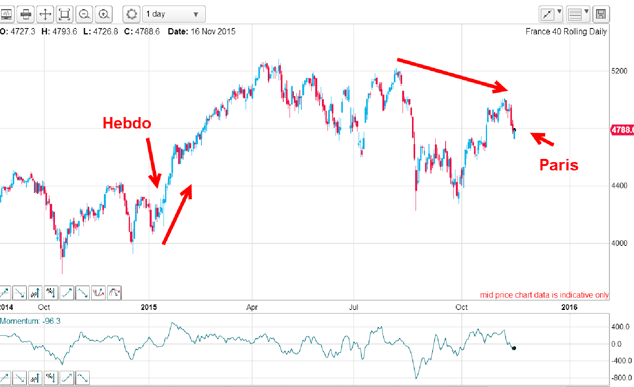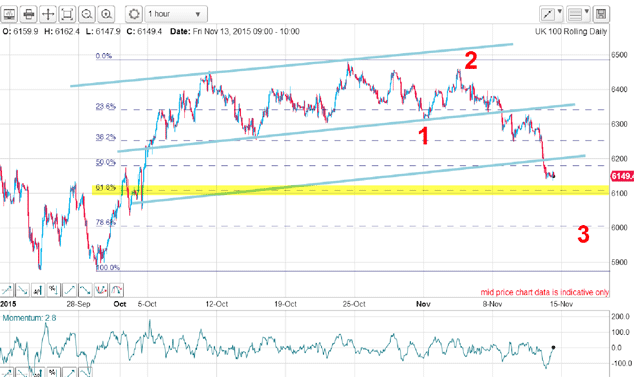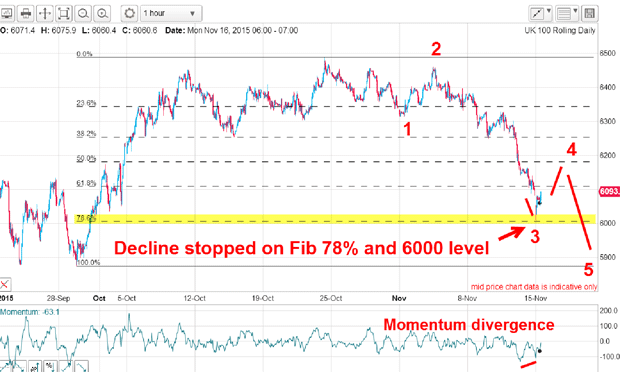The FTSE is creeping up – but for how long?
A rally appears to be getting underway in the FTSE 100. John C Burford explains why this could be the start of a swing traders' market.
Get the latest financial news, insights and expert analysis from our award-winning MoneyWeek team, to help you understand what really matters when it comes to your finances.
You are now subscribed
Your newsletter sign-up was successful
Want to add more newsletters?
This morning, I thought I would issue a follow-up to my Friday post("Hold onto your hats the FTSE is plummeting"). The Paris bombings late on Friday have shaken up the Western world and have had a major effect on markets.
The reaction of the public to these bombings has been much more fearful than after previous terrorist attacks. That tells me the public mood is shifting to a more negative state. That has negative implications for stockmarkets after all, changing social mood drives bull and bear markets.
When theCharlie Hebdo attack happened in January, the French market was in a strong bull phase. Below is a chart of the CAC index in January, the market was in a bullish phase, and public reaction to the Hebdo attacks was defiant and powerful. The stockmarket hardly moved:
Try 6 free issues of MoneyWeek today
Get unparalleled financial insight, analysis and expert opinion you can profit from.

Sign up to Money Morning
Don't miss the latest investment and personal finances news, market analysis, plus money-saving tips with our free twice-daily newsletter
Don't miss the latest investment and personal finances news, market analysis, plus money-saving tips with our free twice-daily newsletter

But this weekend, with the market in a downtrend, the public reaction has been characterised by greater fear.
I had forecast a move down in the FTSE to the Fibonacci 62% support level where I expected a bounce of some sort. I wrote this well before the Paris atrocities had taken place. The chart I showed is below. The market was trading hard down and had broken below my third lower tramline and was approaching the Fibonacci 62% level:

During Friday, the market seemed to stabilise around that 62% level, but with markets closed, the Paris news hit the wires, and when trading resumed late last night, it opened hard down, as expected.
But, in the early hours, the FTSE staged a rally and as I write, is trading up on Friday's close.
During the mini selling panic on Sunday night, the decline was stopped precisely at the Fibonacci 78% support which was also right on the round-number 6,000 level!

That overnight plunge to the 6,000 level could be the end of my wave 3 down. I have a small momentum divergence between the lows on the 78% and 62% which adds to the likelihood for a decent rally in wave 4.
I know not many traders were at their screens in the early hours, but that was an ideal time to take partial profits on their shorts.
Now it appears the rally is starting, but it is counter-trend. When wave 4 ends, that should be a great place to re-enter.
But with the much-anticipated announcement of the Fed interest rate possible hike round the corner, the market will undoubtedly become much more volatile with large swings up and down in other words, a traders' market.
Get the latest financial news, insights and expert analysis from our award-winning MoneyWeek team, to help you understand what really matters when it comes to your finances.
John is is a British-born lapsed PhD physicist, who previously worked for Nasa on the Mars exploration team. He is a former commodity trading advisor with the US Commodities Futures Trading Commission, and worked in a boutique futures house in California in the 1980s.
He was a partner in one of the first futures newsletter advisory services, based in Washington DC, specialising in pork bellies and currencies. John is primarily a chart-reading trader, having cut his trading teeth in the days before PCs.
As well as his work in the financial world, he has launched, run and sold several 'real' businesses producing 'real' products.
-
 Three Indian stocks poised to profit
Three Indian stocks poised to profitIndian stocks are making waves. Here, professional investor Gaurav Narain of the India Capital Growth Fund highlights three of his favourites
-
 UK small-cap stocks ‘are ready to run’
UK small-cap stocks ‘are ready to run’Opinion UK small-cap stocks could be set for a multi-year bull market, with recent strong performance outstripping the large-cap indices